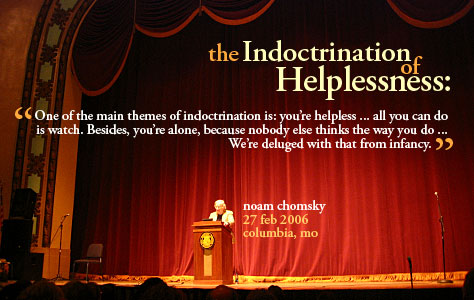
27 February 2006
Noam Chomsky

In a rare treat for Columbia, Noam Chomsky was here tonight, giving a talk to a full house at the Missouri Theatre. Following on the heels of the ever-more-successful True/False Film Festival, it almost feels like just in the space of a few days, ol' Columbia has taken a kind of intangible step up toward a more intelligent, cultured identity. Well, it's a nice balance to all the bleak landscape of cheap, flimsy, rapacious commercial development that's currently scouring the city.
As anyone who's familiar with Chomsky knows, his thoughts are difficult to summarize briefly or neatly. But generally speaking, his focus tonight was on skewering the popular notion that the U.S. is engaged in promoting democracy around the world. Relating telling examples from around the world, from Lebanon and Turkey to Iraq and Palestine, Chomsky neatly debunked the rhetoric we've heard from our present administration and used their own words and actions to paint a picture of a pseudo-interest in spreading democracy that is really nothing more than the crass furthering of strategic military interests masquerading as something based on noble ideals.
Rather than attempt to break down the hour-plus talk (and additional 20 minutes of Q&A), I think the best excerpt I can relate is Chomsky's closing recommendations for how to steer our country and the world out of its present dangerous situation:
- Accept the jurisdiction of the International Criminal Court and the World Court.
- Sign the Kyoto protocols and carry them forward.
- Let the United Nations take the lead in international crises.
- Rely on diplomatic and economic measures rather than military ones in confronting the grave threats of terror.
- Keep to the conventional, conservative interpretation of the United Nations charter: the use of force is legitimate only when ordered by the Security Council or when the country is under imminent threat of attack--until the Security Council can act (article 51 of the UN charter).
- Give up the veto at the Security Council and have a decent respect for the opinions of mankind.
- Cut back sharply on military spending and sharply increase social spending--health, education, renewable energy, and so on.
For people who believe in democracy, these are very conservative suggestions. And if there were any conservatives in the country, they'd all be in favor of them. There's a very simple reason for it: these are the opinions of the majority of the U.S. population. And they're in radical opposition to public policy--in most cases, a bipartisan consensus.


